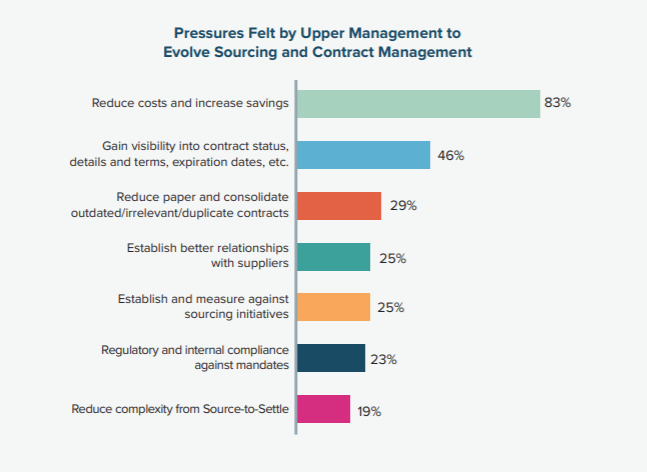There has been significant upheaval and uncertainty over the past 6 months as a direct result of the Covid-19 pandemic. At the start of this pandemic, there was hope of normality returning at some point in the not too distant future. As the months have passed, it has become apparent that we are living in something of a ‘new normal’, at least for another period of time. Due to this continued uncertainty it has been necessary for organizations to look at how they can both reduce costs and increase profitability. One of the key ways to achieving this is through the effective management of contracts.
When you think of a business contract it is likely that vendor contracts will spring to mind. While vendor contracts make up a large proportion of contracts within an organization, there are many other types that should not be ignored, such as customer contracts, HR contracts and lease agreements. Effective contract management in each of these areas can have a major impact on reducing costs and increasing profitability. As KPMG explain in a recent report, “the ability to systematically manage contract creation, execution and analysis is central to risk management, financial performance and operational efficiency.”
However, without a centralized contract management solution in place you will struggle to gain the control over your contracts that will allow you to unlock profitability in your organization.
As reported by Levvel Research, the main reasons why organizations focus on contract management is to reduce costs, increase savings and gain visibility to ensure regulatory compliance.

Each aspect of a contract’s lifecycle needs to be managed closely in order to effectively manage spend and cash flow and reduce costs.
Without control and visibility over your contracts you face several position risks. For example, you may miss important deadlines, be unaware of auto-renewals, be susceptible to supplier non-compliance, be unaware of important contract T&Cs or even falling down on contract compliance. All of these things can have a big impact on profitability.
How Contract Management Impacts Profitability
According to PWC, organizations are leaking up to 15% of value from their business through poor contract management. This does not have to be the case though. It is possible to flip this on its head. When contracts are managed effectively as opposed to leaking value they can instead unlock opportunities for your organization. To make this possible, a centralized contract management system is vital.
1. Expirations/Auto-Renewals/Deadlines
Without control and visibility over your contracts, you leave yourself susceptible to missing important contract deadlines and renewals.
In the case of vendor contracts, this could mean a contract automatically renewing before you had the chance to re-negotiate terms that could allow you to improve cash flow. Alternatively, you could end up tying yourself down to a vendor that has continuously under-performed against their contractual obligations.
If a customer contract were to expire without your prior knowledge, you may end up losing important revenue that may have had a big impact on your company’s future profits. Depending on the size of the contract, you may then be left needing to quickly fill the gap.
Even HR contracts can have a role to play in your company’s profits. For example, many employee contracts will contain an initial probation or review periods, after which terms change. Without visibility over upcoming deadlines such as these, you may end up incorrectly forecasting overhead costs for the coming months, or miss the opportunity to review the staff’s performance.
With unexpected expirations and renewals of contracts a common form of revenue leakage it’s easy to see why “improved ability to manage contract renewals” ranked as the number one benefit of contract management systems in a recent Levvel Research report.
With a contract management system, you can set specific dates against contracts at the time of creation. This ensures that you receive proactive notifications of upcoming renewals and expirations. Even if you fail to set specific reminder dates, the system will still send you reminders at pre-set intervals, meaning you will never lose valuable customer revenue unexpectedly, be tied down to unwanted vendor contracts or miss the opportunity to re-negotiate contracts.
2. Data Compliance
Contracts contain a significant amount of personal data and therefore it is important that this data is managed compliantly. The costs of not managing data compliantly can be significant.
General Data Protection Regulation (GDPR) was implemented by the EU in 2018 to protect data belonging to EU citizens and residents. The law therefore applies to organizations that handle such data whether they are EU-based organizations or not.
There are 7 key principles of GDPR; fairness and transparency, purpose limitation, data minimization, accuracy, storage limitation, security and accountability.
If you are holding personal data without consent, are not storing the data securely or have retained it for a longer period than allowed, you could be in breach of the regulations and liable to fines. To date, the biggest GDPR fines include Google’s $57 million and British Airways $230 million fine, both in 2019.
Contract management solutions automate the management of this data to ensure you remain compliant.
Document retention workflows can be configured based on regulatory requirements including retention dates, the purpose of keeping a document or the subject’s consent for keeping personal data. Where documents are expiring beyond their retention policy, alerts are sent to give advance warning. The documents will then be removed from storage through ‘digital shredding’ ensuring you do not obtain data longer than required and thus remove the risk of being fined.
3. Spend Control & Visibility
As mentioned previously, control and visibility over contracts is key to unlocking profitability. It is particularly important to have control and visibility over your contract spend. Without it, your organization could be using vendors with unfavorable contract terms that require re-negotiation, using vendors that continue to act non-compliantly, overspending against budgets in less profitable areas of the business, continually being overcharged or have a number of outstanding invoices against contracts that have not been factored into accruals reporting.
A contract management system with advanced reporting capabilities assesses all areas of contract spend and enables you to change your tactics accordingly in order to improve profitability. Installment plans and automatic matching also ensure invoices received are accurate as per agreed contracts, based on forecasted amounts allocated to each month.


